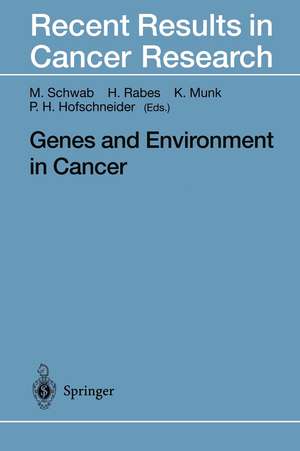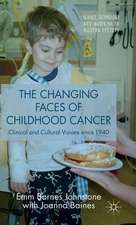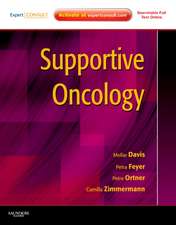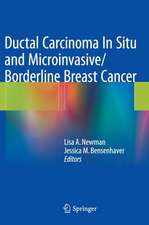Genes and Environment in Cancer: Recent Results in Cancer Research, cartea 154
Editat de Manfred Schwab, Hartmut M. Rabes, Klaus Munk, Peter H. Hofschneideren Limba Engleză Paperback – mar 2012
Din seria Recent Results in Cancer Research
- 5%
 Preț: 845.19 lei
Preț: 845.19 lei - 5%
 Preț: 191.70 lei
Preț: 191.70 lei - 5%
 Preț: 782.46 lei
Preț: 782.46 lei - 5%
 Preț: 913.76 lei
Preț: 913.76 lei - 5%
 Preț: 919.23 lei
Preț: 919.23 lei - 5%
 Preț: 400.28 lei
Preț: 400.28 lei - 15%
 Preț: 490.42 lei
Preț: 490.42 lei - 5%
 Preț: 703.83 lei
Preț: 703.83 lei - 5%
 Preț: 721.05 lei
Preț: 721.05 lei - 5%
 Preț: 709.35 lei
Preț: 709.35 lei - 5%
 Preț: 711.15 lei
Preț: 711.15 lei - 5%
 Preț: 710.60 lei
Preț: 710.60 lei - 5%
 Preț: 713.33 lei
Preț: 713.33 lei - 5%
 Preț: 361.80 lei
Preț: 361.80 lei - 5%
 Preț: 712.60 lei
Preț: 712.60 lei - 5%
 Preț: 371.10 lei
Preț: 371.10 lei - 5%
 Preț: 721.96 lei
Preț: 721.96 lei - 5%
 Preț: 716.84 lei
Preț: 716.84 lei - 5%
 Preț: 356.32 lei
Preț: 356.32 lei - 5%
 Preț: 719.74 lei
Preț: 719.74 lei - 5%
 Preț: 717.56 lei
Preț: 717.56 lei - 5%
 Preț: 359.60 lei
Preț: 359.60 lei - 5%
 Preț: 706.41 lei
Preț: 706.41 lei - 5%
 Preț: 717.73 lei
Preț: 717.73 lei - 5%
 Preț: 719.19 lei
Preț: 719.19 lei - 5%
 Preț: 705.32 lei
Preț: 705.32 lei - 5%
 Preț: 718.29 lei
Preț: 718.29 lei - 5%
 Preț: 717.20 lei
Preț: 717.20 lei - 5%
 Preț: 711.15 lei
Preț: 711.15 lei - 5%
 Preț: 712.25 lei
Preț: 712.25 lei - 5%
 Preț: 710.96 lei
Preț: 710.96 lei - 5%
 Preț: 378.97 lei
Preț: 378.97 lei - 5%
 Preț: 1089.68 lei
Preț: 1089.68 lei - 5%
 Preț: 361.06 lei
Preț: 361.06 lei - 5%
 Preț: 712.25 lei
Preț: 712.25 lei - 5%
 Preț: 715.55 lei
Preț: 715.55 lei - 5%
 Preț: 716.84 lei
Preț: 716.84 lei - 5%
 Preț: 720.68 lei
Preț: 720.68 lei - 5%
 Preț: 707.86 lei
Preț: 707.86 lei - 5%
 Preț: 732.01 lei
Preț: 732.01 lei - 5%
 Preț: 715.91 lei
Preț: 715.91 lei - 5%
 Preț: 723.05 lei
Preț: 723.05 lei - 5%
 Preț: 369.10 lei
Preț: 369.10 lei - 5%
 Preț: 709.35 lei
Preț: 709.35 lei - 5%
 Preț: 712.60 lei
Preț: 712.60 lei - 5%
 Preț: 711.52 lei
Preț: 711.52 lei - 5%
 Preț: 719.38 lei
Preț: 719.38 lei - 5%
 Preț: 709.14 lei
Preț: 709.14 lei - 5%
 Preț: 710.06 lei
Preț: 710.06 lei - 5%
 Preț: 724.70 lei
Preț: 724.70 lei
Preț: 719.59 lei
Preț vechi: 757.46 lei
-5% Nou
Puncte Express: 1079
Preț estimativ în valută:
137.69€ • 143.77$ • 113.70£
137.69€ • 143.77$ • 113.70£
Carte tipărită la comandă
Livrare economică 15-29 aprilie
Preluare comenzi: 021 569.72.76
Specificații
ISBN-13: 9783642468728
ISBN-10: 3642468721
Pagini: 384
Ilustrații: XIV, 368 p. 8 illus. in color.
Dimensiuni: 152 x 229 x 20 mm
Greutate: 0.51 kg
Ediția:Softcover reprint of the original 1st ed. 1998
Editura: Springer Berlin, Heidelberg
Colecția Springer
Seria Recent Results in Cancer Research
Locul publicării:Berlin, Heidelberg, Germany
ISBN-10: 3642468721
Pagini: 384
Ilustrații: XIV, 368 p. 8 illus. in color.
Dimensiuni: 152 x 229 x 20 mm
Greutate: 0.51 kg
Ediția:Softcover reprint of the original 1st ed. 1998
Editura: Springer Berlin, Heidelberg
Colecția Springer
Seria Recent Results in Cancer Research
Locul publicării:Berlin, Heidelberg, Germany
Public țintă
Professional/practitionerCuprins
I. Key Notes.- Epidemiological Evidence of the Effects of Behaviour and the Environment on the Risk of Human Cancer.- Molecular Epidemiology of Human Cancer.- II. Risk Assessment and DNA Lesions.- Molecular Epidemiology of Environmental Carcinogenesis.- Polymorphisms of N-Acetyltransferases, Glutathione S-Transferases, Microsomal Epoxide Hydrolase and Sulfotransferases: Influence on Cancer Susceptibility.- Impact of Adduct Determination on the Assessment of Cancer Susceptibility.- Mutation Spectra Resulting from Carcinogenic Exposure: From Model Systems to Cancer-Related Genes.- III. DNA Repair and Genetic Susceptibility.- Relevance of DNA Repair to Carcinogenesis and Cancer Therapy.- Molecular Basis of DNA Repair Mechanisms and Syndromes.- The Ataxia Telangiectasia Gene in Familial and Sporadic Cancer.- IV. Induced Chromosome Damage and Cancer.- Cancer Predictive Value of Cytogenetic Markers Used in Occupational Health Surveillance Programs.- Instability at Chromosomal Fragile Sites.- The Role of Deletions at the FRA3B/FHIT Locus in Carcinogenesis.- Gene Amplification Mechanisms: The Role of Fragile Sites.- V. Genetic Susceptibility and Environmental Exposure: ‘The RET Paradigm’.- Mechanisms of Development of Multiple Endocrine Neoplasia Type 2 and Hirschsprung’s Disease by ret Mutations.- Rearrangements of RET and NTRK1 Tyrosine Kinase Receptors in Papillary Thyroid Carcinomas.- Molecular Genetics of Childhood Papillary Thyroid Carcinomas After Irradiation: High Prevalence of RET Rearrangement.- Thyroid Carcinomas in RET/PTC Transgenic Mice.- Signal Transduction by the Receptor Tyrosine Kinase Ret.- VI. Population Genetics of Cancer Susceptibility.- Complex Traits on the Map.- Genetic Mapping of Cancer Susceptibility/Resistance Loci in the Mouse.- CancerEpidemiology in Migrant Populations.- Molecular Epidemiology of Hereditary Nonpolyposis Colorectal Cancer in Finland.- VII. Virus and Cancer: The HBV/HCV Paradigm.- The PreS2 Activators of the Hepatitis B Virus: Activators of Tumour Promotor Pathways.- Antiviral Cell-Mediated Immune Responses During Hepatitis B and Hepatitis C Virus Infections.- The Role of Hepatitis C Virus in Hepatocellular Carcinoma.- Overview of Viruses, Cancer, and Vaccines in Concept and in Reality.
Textul de pe ultima copertă
Different cancer types can result from a multiplicity of environmental and genetic factors. Molecular epidemiology has focused recently on elucidating relationships between particular genetic alterations and the type of environmental exposure. Several genes have been identified as strong determinants for a number of cancer types. The incomplete penetrance often evidenced by mutations of these genes has raised the possibility that additional endogenous or exogenous determinants are involved in cancer development or suppression. The major aim of this book is to present an integrated view of environmental, epidemiological, and genetic determinants that contribute to cancer susceptibility and progression.













